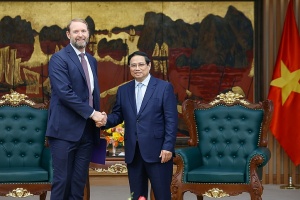Investors and legislation at odds on energy contracts
Under Decree No.56/2025/ND-CP, issued on March 3, elaborating on the Electricity Law about power development, grid development strategy, investment of power projects, and the tendering process for selecting power investors, imported liquefied natural gas (LNG) power schemes must secure a minimum contract quantity (Qc) of at least 65 per cent of the average power generation during the loan repayment period, capped at 10 years post-commercial operation date.
However, Vietnam Electricity (EVN) said that LNG imported power investors want to be committed to Qc at 72-90 per cent for the entire contract term. This request comes from lenders to ensure stable cash flow for investors to repay their debts.
LNG fuel suppliers and transporters also often request regulations on mobilisation rates to ensure stability in fuel quantity and price in the long term. This also helps them plan international sea transport, especially when Vietnam is a new and small market for international LNG suppliers.
“However, accepting the Qc condition of 72-90 per cent as proposed by investors will pose a risk of increasing electricity prices,” EVN commented.
According to EVN’s calculations, LNG gas has a high cost, at $12-14/million BTU when imported to Vietnamese ports. Thus, the cost of electricity generation of a gas-fired power plant using imported LNG fuel will be much higher than other power sources. With high electricity generation costs, large fluctuations, and long-term output commitment requirements, EVN’s input electricity purchase costs will be greatly impacted, strongly affecting the retail price of electricity output.
However, to avoid the risk of power shortage, EVN believes that it is necessary to clearly define Qc through a long-term contract to ensure the harmony of interests of all parties and has proposed that the prime minister decide on an appropriate rate during the debt repayment period of the project with a proposed rate of about 65 per cent.
EVN is negotiating power purchase agreements with Nhon Trach 3 and Nhon Trach 4 projects, but they have not yet agreed on the level of commitment to purchase electricity output from these plants.
A representative of one foreign bank said that if the PPA requires the clause, it will be difficult for investors to borrow capital because foreign banks will be unable to accept it.
“If the investor himself has other sources of income from the LNG power project or is guaranteed by a multi-industry parent company, it will be easier to borrow from foreign financial institutions, even with the clause. However, if there is only cash flow from the project itself, foreign banks will find it difficult to lend,” he said.
When implementing a large and complicated project, there may be a point where procedures are not completed promptly. If the inspection agency considers it a violation of regulations and retroactively applies, the project’s cash flow will no longer be as originally planned. Investors also have no other source to repay the debt, so the feasibility of repaying is not strong.
“Foreign investors often set up a business to implement the project and borrow under project financing without guarantees, so banks will be no different from investors. If they only have cash flow to repay debt from the PPA, it will be difficult for them,” he added
During a working trip to South Korea by the leaders of the central province of Quang Tri last year, on accelerating the progress of Hai Lang LNG project, the investors requested the provincial People’s Committee to urge top-level leaders to approve the appropriate electricity output consumption rate of the project, with a Qc level of 85-90 per cent, to ensure the feasibility of capital arrangement.
In addition, the investors requested early approval of the connection plan and acceleration of the completion of the power line and transformer station, ensuring compliance with the commercial operation progress of the project and paying attention to supporting the site clearance work.
 | Pacifico Energy eyes major wind energy investments in Vietnam Prime Minister Pham Minh Chinh met with Nate Franklin, chairman of Pacifico Energy Group from the United States, on March 12 to discuss wind power projects. |
What the stars mean:
★ Poor ★ ★ Promising ★★★ Good ★★★★ Very good ★★★★★ Exceptional
Related Contents
Latest News
More News
- $100 million initiative launched to protect forests and boost rural incomes (January 30, 2026 | 15:18)
- Trung Nam-Sideros River consortium wins bid for LNG venture (January 30, 2026 | 11:16)
- Vietnam moves towards market-based fuel management with E10 rollout (January 30, 2026 | 11:10)
- Envision Energy, REE Group partner on 128MW wind projects (January 30, 2026 | 10:58)
- Vingroup consults on carbon credits for electric vehicle charging network (January 28, 2026 | 11:04)
- Bac Ai Pumped Storage Hydropower Plant to enter peak construction phase (January 27, 2026 | 08:00)
- ASEAN could scale up sustainable aviation fuel by 2050 (January 24, 2026 | 10:19)
- 64,000 hectares of sea allocated for offshore wind surveys (January 22, 2026 | 20:23)
- EVN secures financing for Quang Trach II LNG power plant (January 17, 2026 | 15:55)
- PC1 teams up with DENZAI on regional wind projects (January 16, 2026 | 21:18)

 Tag:
Tag:




















 Mobile Version
Mobile Version